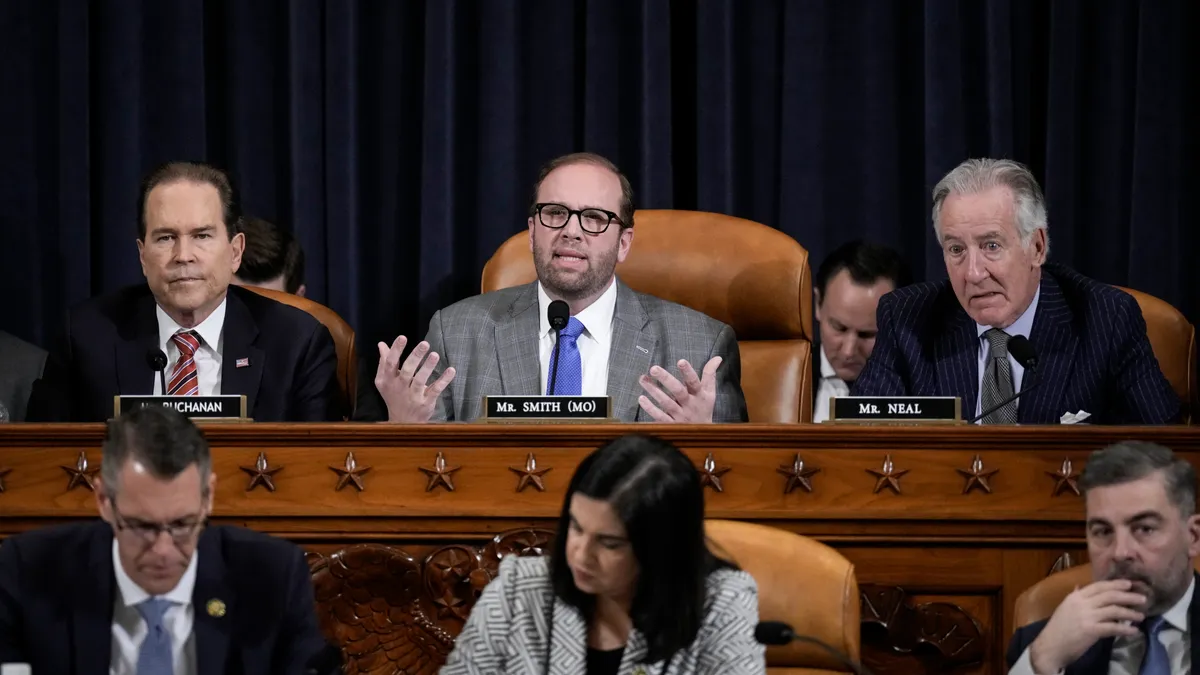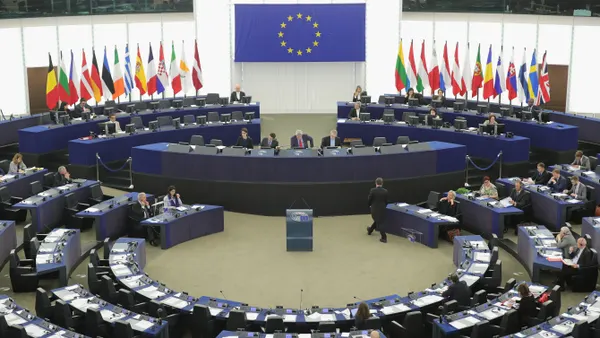Dive Brief:
- House Republicans from the Ways and Means Committee argued Tuesday the Department of Labor’s rule allowing retirement plan managers to consider environmental, social and governance factors when investing runs afoul of tax code requirements that predate it.
- During the committee hearing, Missouri lawmaker and chair of the committee, Jason Smith, called ESG investing a threat to retirement savings and said the committee has “a duty to ensure that our tax rules support Americans' financial security.” Democrats refuted the claim, calling the hearing a “bogus issue,” and said the committee should be focusing on the looming government shutdown.
- Other Republicans testifying also mirrored this objection to the Biden administration rule that went into effect in January and has, thus far, seen the president veto a legislative attempt to stop it and withstood legal challenges by a coalition of Republican state attorneys general.
Dive Insight:
The Labor Department’s Prudence and Loyalty in Selecting Plan Investments and Exercising Shareholder Rights rule permits employee retirement fund managers to consider ESG during investment decisions. The final rule altered proposed language on the topic from saying risks “may often require” to “may include” ESG considerations, which has helped the regulation survive a legal challenge.
Smith noted the rule overrode a 2020 regulation from the Trump administration’s Labor Department that prohibited retirement fund managers from using ESG factors in investments. He said the Biden administration’s superseding rule “favors ESG activism” and is using “retirement savings to finance a political agenda.”
“Democrats are trying to enshrine so-called ‘environmental, social and governance’ ideology into America’s financial system by removing protections for savers in the tax code,” Smith said. “Working families need that protection to prevent Wall Street money managers from putting climate alarmism and far-left policies ahead of their retirement security.”
The committee’s chair said the rule runs afoul of tax code requirements for managers of “tax-advantaged retirement plans” who “must manage these accounts for the exclusive benefit of retirees.”
Republicans on the committee called four witnesses during the hearing: Preston Rutledge, a former Trump administration Assistant Secretary of Labor; Jason Isaac, a former Republican state representative and director of a national Texas Public Policy Foundation initiative; Utah State Treasurer Marlo Oaks; and Mason Bolay, vice president of First Bank & Trust in Oklahoma.
Rutledge, who left the Labor Department before the 2020 rule was finalized, said at the time the agency observed that “there was no consensus about what constituted ESG investing and that rating systems were vague and inconsistent.” He added the department has dealt with issues related to the Employment Retirement Income Security Act of 1974 almost since it was enacted.
“The north star of ERISA, embodied in the statutory text, is that fiduciaries must discharge their duties with respect to a plan solely in the interest of, and for the exclusive purpose of providing benefits to, the participants and their beneficiaries,” Rutledge said in a written testimony. “The interest of participants and beneficiaries in their retirement income must remain the overriding concern of ERISA plan fiduciaries.”
Texas Democrat Rep. Lloyd Doggett accused the committee’s Republicans of calling the hearing — titled, in part, “ensuring that ‘woke’ doesn’t leave Americans broke” — to play into a “white nationalist” base of their party instead of focusing on a Nov. 17 government funding deadline.
“We are going to be four days from a shutdown of all of the government next Monday. We could be acting on this today, instead of this nonsense,” Doggett said at the hearing. “[The focus on ‘wokeness’] really appeals to the white nationalists that support, as part of the coalition that support Republicans, people that object to those who might be adopting policies to overcome some historic injustices to people of color.”
Democrats in the committee’s minority called Brandon Rees, deputy director of the AFL-CIO’s Office of Investment. The AFL-CIO is the largest federation of unions in the United States.
“The Department of Labor has long regulated retirement plan fiduciaries in the consideration of ESG factors, and retirement plan fiduciaries understand that the consideration of ESG factors must be considered through the lens of loyalty and prudence in protecting retirement savings of the working people that they've been entrusted to protect,” Rees told the committee.
Rees said state bills, like Texas’ blacklist of companies that “boycott” fossil fuel companies or other similar blacklists of companies who consider ESG factors, are “estimated to cost billions of dollars to state retirement systems.”










